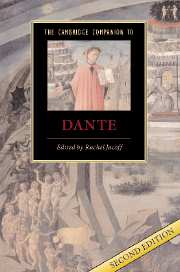Book contents
- Frontmatter
- 1 Life of Dante
- 2 Dante and the lyric past
- 3 Approaching the Vita nuova
- 4 From auctor to author: Dante before the Commedia
- 5 Introduction to Inferno
- 6 Introduction to Purgatorio
- 7 Introduction to Paradiso
- 8 Dante and the Bible
- 9 Dante and the classical poets
- 10 Allegory and autobiography
- 11 A poetics of chaos and harmony
- 12 The theology of the Comedy
- 13 The poetry and poetics of the creation
- 14 Dante and Florence
- 15 Dante and the empire
- 16 Dante and his commentators
- 17 Dante in English
- Further reading
- Index
- Series List
13 - The poetry and poetics of the creation
Published online by Cambridge University Press: 28 May 2007
- Frontmatter
- 1 Life of Dante
- 2 Dante and the lyric past
- 3 Approaching the Vita nuova
- 4 From auctor to author: Dante before the Commedia
- 5 Introduction to Inferno
- 6 Introduction to Purgatorio
- 7 Introduction to Paradiso
- 8 Dante and the Bible
- 9 Dante and the classical poets
- 10 Allegory and autobiography
- 11 A poetics of chaos and harmony
- 12 The theology of the Comedy
- 13 The poetry and poetics of the creation
- 14 Dante and Florence
- 15 Dante and the empire
- 16 Dante and his commentators
- 17 Dante in English
- Further reading
- Index
- Series List
Summary
In the Commedia, Dante first mentions the creation at the very beginning, when the protagonist has put the dark wood behind him and finds himself at the foot of the hill of virtue, where he is stopped by the leopard of lust. We are immediately given the hour of the day and season of the events about to unfold: a spring morning with the sun in the constellation of Aries, i.e., the spring equinox, precisely the time of year when, according to medieval tradition, God had created the universe: when the sun “was mounting with those stars which were with it when Divine Love first set in motion those fair things.” For one moment, as the sun of this first spring lightens the landscape, the terror which had seized Dante in the dark wood seems to give way to hope. Dante clearly feels nostalgia for the Beginning as some essential aspect of his own self: a feeling which is both sensual and intellectual. The idea of the beginning of all things allows him, imaginatively, to see and enjoy the sun and stars as “cose belle” (fair things), and not simply “good,” as Genesis has it. This first firmament possesses a pulchritudo of intimate and pristine aesthetics, like the dawn and the aura which the “things” shed on everything surrounding them.
- Type
- Chapter
- Information
- The Cambridge Companion to Dante , pp. 218 - 235Publisher: Cambridge University PressPrint publication year: 2007

